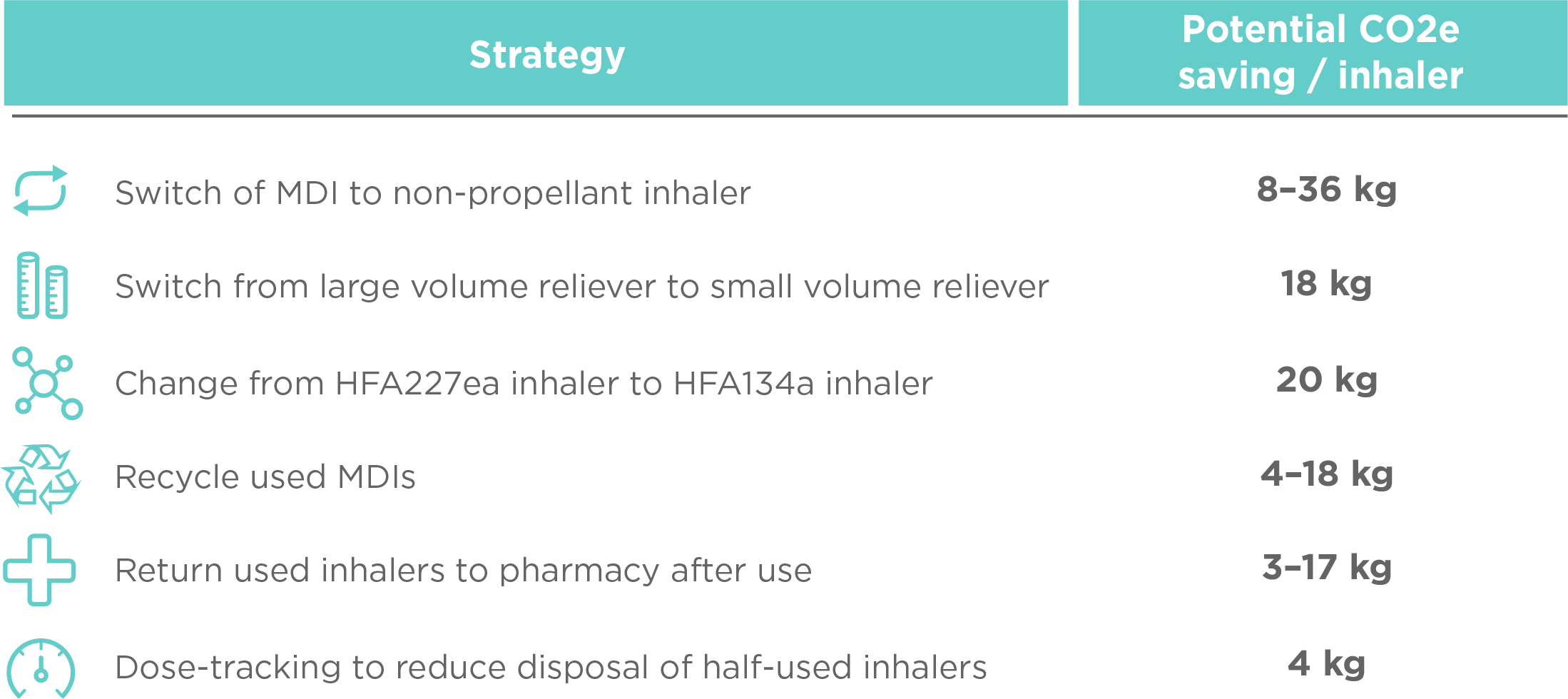Combating climate change with a sustainable inhaler
Publikationer | 2024-01-19Study Summery:
Combating climate change with a sustainable inhaler
Wilkinson et al. 2019 BMJ Open
- There have been calls to replace pressurised metered-dose inhalers (pMDIs) with more sustainable alternatives such as dry powder inhalers (DPIs) in order to combat climate change.
- This study assessed the estimated carbon savings and cost of switching from pMDIs to DPIs in England.
- Switching from pMDIs to DPIs was estimated to result in a significant reduction in carbon emissions that could be achieved cost-efficiently by preferring less expensive DPI brands.
- Inhaler sustainability should be considered when choosing between equally efficient treatment options, for any asthma or COPD patient.
pMDIs contain chemical propellants that are potent greenhouse gases. After banning of ozone-depleting chlorofluorocarbons (CFCs) under the Montreal Protocol, CFCs were replaced with hydrofluoroalkane (HFA) propellants, mainly HFA134a and HFA227ea. Although less harmful for the ozone layer, HFAs possess high global warming potential. Approximately 70% of asthma and COPD patients are currently using pMDIs in the UK. pMDIs have been estimated to contribute approximately 3.9% of the total carbon footprint of the National Health Service (NHS). Based on the adverse environmental impact of pMDIs, multiple organisations have recommended replacing them with low global warming potential inhalers, such as DPIs or aqueous mist inhalers, that don’t contain HFA propellants (Figure 1).
This study utilised NHS prescription data from England in 2017 and collated carbon footprint data on inhalers commonly used, to estimate the impact of replacing pMDIs with DPIs on CO2 savings and drug costs. Two alternative switch scenarios were modelled: 1) pMDIs were replaced with equivalent DPIs proportionally according to current market share of each DPI brand (proportional replacement model) or 2) pMDIs were replaced with equivalent lowest cost DPIs.
In both replacement scenarios, for every 10% of currently used pMDIs replaced with low global warming potential inhalers, such as DPIs, 58 kt carbon dioxide equivalents (CO2e) was reduced annually. Changing one MDI device to a DPI could save 150–400 kg CO2e annually. In addition, preferring small volume over large volume pMDIs, or utilising HFA134a instead of HFA227ea as propellant, was associated with clear carbon savings.
Replacing all pMDIs in England with DPIs in proportions that represent current brand prescription patterns increased the annual drug costs. However, when pMDIs were replaced with the equivalent least expensive DPI brand in the market, a notable £8.2M decrease in annual drug costs was observed for every 10% of pMDIs replaced. To give an example, switching from formoterol pMDI to formoterol Easyhaler resulted in savings of £1.02M for every 10% of pMDIs replaced. The greatest potential savings were related to inhaled corticosteroid (ICS)-long-acting beta agonist (LABA) combination therapies, where switching from pMDI to the least expensive DPI resulted in £10.0M savings for every 10% of inhalers switched.

Figure 1. Strategies to reduce greenhouse gas emissions from MDIs and potential carbon savings. CO2e, carbon dioxide equivalent.
Combating climate change is among the greatest challenges of our time. The results of this study suggest that switching from MDIs to DPIs, such as Easyhaler, would result in substantial carbon savings and could also be achieved in a cost-efficient manner by preferring less expensive DPI brands. It is obvious that the patient’s needs should always be the primary selection criteria for an inhaler, but whenever weighing options of equivalent efficiency the environmental impact of the alternatives should not be neglected.
Skribent: Wilkinson et al. 2019 BMJ Open

